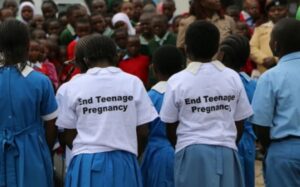Early teenage pregnancies are a growing concern in Kenya, particularly among teens from marginalized and disenfranchised communities. Areas such as Nairobi, Mombasa, and Nakuru have seen a steady rise in teenage pregnancy cases, fueled by a combination of social, economic, and cultural factors.
Causes of Early Teenage Pregnancies
- Poverty and Lack of Education
In marginalized communities, poverty plays a significant role in early teenage pregnancies. Many young girls are forced into relationships or transactional sex to meet basic needs, such as food, clothing, and school fees. The lack of financial resources also limits access to education, and girls who are not in school are more likely to become pregnant. In Mombasa, for example, the high cost of living forces some girls to engage in unsafe relationships for survival. - Cultural Norms and Gender Inequality
Cultural attitudes that view women as inferior or only valuable for their reproductive roles often put girls at risk. In certain communities in Nairobi’s informal settlements, early marriages are still prevalent, and teenage girls are married off to older men. The lack of decision-making power and autonomy makes it difficult for girls to protect themselves from pregnancy. - Lack of Comprehensive Sexual Education
In many Kenyan schools, especially in rural and disadvantaged areas, comprehensive sexual education is inadequate. Teenagers are not given the necessary information to make informed decisions about their sexual health. As a result, they may not understand the risks of unprotected sex. In Nakuru, this lack of education has contributed to a rise in pregnancies among young girls who are unaware of family planning methods.

- Peer Pressure and Influence of Media
The growing influence of social media and peer pressure can also lead teens to engage in risky sexual behavior. Many teens are exposed to content that normalizes sexual activity, and without proper guidance, they may engage in unsafe practices.
Addressing the Problem
- Improving Access to Education
Keeping girls in school is one of the most effective ways to prevent teenage pregnancies. Society, especially in marginalized areas like Nairobi’s informal settlements, should ensure that girls have access to quality education and programs that empower them to stay in school. - Comprehensive Sexual Education
Schools in cities like Mombasa and Nakuru should adopt comprehensive sexual education programs that teach teenagers about reproductive health, contraception, and making informed decisions. - Community Support and Awareness
Engaging community leaders and parents in discussions about teenage pregnancy is vital. Awareness campaigns can help challenge harmful cultural norms, such as child marriages, and promote gender equality.
By addressing these root causes and providing better support systems for young girls, society can reduce the rate of teenage pregnancies in Kenya.